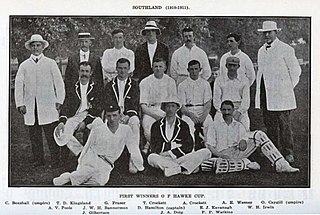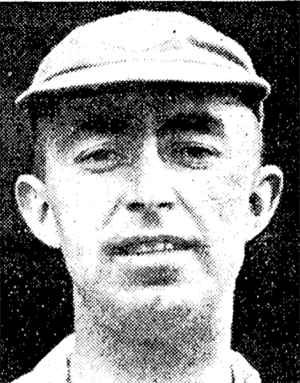Related Research Articles
John Robert Nimmo was a New Zealand cricketer. He played two first-class matches for Otago, one in each of the 1933–34 and 1936–37 seasons.
Kevin James O'Connor is a New Zealand former cricketer who played six first-class matches for Otago, three in each of the 1969–70 and 1970–71 seasons.

The Southland cricket team represents the Southland Region of New Zealand. They compete in the Hawke Cup.
Arthur Ernest Berry was a New Zealand sportsman. He played four first-class cricket matches for Otago during the 1955–56 season and played against touring international rugby union sides.

Thomas James Bryden was a New Zealand cricketer. He played two first-class matches for Otago, one in each of the 1912–13 and 1913–14 seasons. He was killed in action during World War I at the First Battle of Passchendaele.
James Bernard Clark, known as Bernie Clark, was a New Zealand cricketer. He played three first-class matches for Otago between the 1933–34 and 1934–35 seasons.
Thomas Flaws was a New Zealand cricketer. A wicket-keeper, he played 27 first-class matches for Otago between the 1952–53 and 1962–63 seasons.
Robert Crawford Harwood was a New Zealand cricketer. He played five first-class matches for Otago during the 1944–45 and 1945–46 seasons.
Allen Clyde Holden was a New Zealand cricketer. He played two first-class matches for Otago, one in each of the 1937–38 and 1939–40 seasons.
Albert Victor Ernest Manley Keast was a New Zealand sportsman and journalist. He played four first-class cricket matches for Otago between the 1917–18 and 1922–23 seasons as well as playing Hawke Cup cricket for Southland.

Edward Mulcock was a New Zealand cricketer. He played first-class cricket for Canterbury and Otago between the 1936–37 and 1943–44 seasons.
Ronald Lindsay Murdoch is a New Zealand former cricketer. He played six first-class matches for Otago during the 1964–65 season.
William Alexander Priest, also known as Alec Priest, was a New Zealand doctor and cricketer. He played two first-class matches in the Plunket Shield for Otago in the early 1930s and played in the Hawke Cup for Taranaki and Wanganui. Professionally he was a specialist in the treatment of tuberculosis who worked in a number of New Zealand hospitals and conducted research on a travelling scholarship in the 1950s.
Gordon John Robertson, sometimes known as Jack Robertson, was a New Zealand cricketer. He played eleven first-class matches for Otago between the 1937–38 and 1940–41 seasons.
William Alexander Robertson is a New Zealand former cricketer. He played four first-class matches for Otago during the 1960–61 season.
Clifford Vernon Shirley was a New Zealand cricketer. He played one first-class match for Otago during the 1945–46 season and played Hawke Cup and other matches for Southland for more than 15 seasons.
Russell Norman Stewart is a New Zealand former cricketer. He played 17 first-class and two [List A cricket|List A]] matches for Otago between the 1973–74 and 1977–78 seasons.
Arthur Edmund Symonds was a New Zealand sportsman. He played one first-class match for Otago during the 1926–27 season.
Charles William Wordsworth was an English-born cricketer and cricket coach who played in both Australia and New Zealand during the early 20th century. He played first-class cricket for New South Wales and Otago between the 1907–08 and 1909–10 seasons.
Clifford Samuel Gibbs was a New Zealand cricketer. He played in one first-class match in the Plunket Shield for Canterbury in 1930 and played in the Hawke Cup for Marlborough.
References
- ↑ McCarron A (2010) New Zealand Cricketers 1863/64–2010, p. 69. Cardiff: The Association of Cricket Statisticians and Historians. ISBN 978 1 905138 98 2
- ↑ The Southlandian, 1963, p. 56. Invercargill: Southland Boys' High School. (Available online. Retrieved 12 September 2022.)
- ↑ The Southlandian, 1957, pp. 2, 5. Invercargill: Southland Boys' High School. (Available online. Retrieved 12 September 2022.)
- ↑ The Southlandian, 1958, pp. 2, 5, 17, 33. Invercargill: Southland Boys' High School. (Available online. Retrieved 12 September 2022.)
- ↑ The Southlandian, 1958, p. 27, p. 33.
- ↑ The Southlandian, 1957, p. 29.
- ↑ The Southlandian, 1957, p. 36.
- 1 2 The Southlandian, 1958, p. 34.
- ↑ The Southlandian, 1956, p. 43. Invercargill: Southland Boys' High School. (Available online. Retrieved 12 September 2022.)
- 1 2 The Southlandian, 1955, p. 33. Invercargill: Southland Boys' High School. (Available online. Retrieved 12 September 2022.)
- ↑ The Southlandian, 1958, p. 35.
- ↑ The Southlandian, 1959, p. 29. Invercargill: Southland Boys' High School. (Available online. Retrieved 12 September 2022.)
- 1 2 3 4 5 6 7 8 9 10 11 Bob Holloway, CricketArchive. Retrieved 12 September 2022. (subscription required)
- ↑ Canterbury Beats Otago in Brabin Shield Match, The Press , vol. XCVII, issue 28782, 31 December 1958, p. 7. (Available online via Papers Past. Retrieved 12 September 2022.)
- ↑ Wellington Well Ahead in Brabin Tournament, The Press , vol. XCIX, issue 29092, 2 January 1960, p. 12. (Available online via Papers Past. Retrieved 12 September 2022.)
- ↑ Canterbury B wins, The Press , vol. XCIX, issue 29095, 6 January 1960, p. 6. (Available online via Papers Past. Retrieved 12 September 2022.
- ↑ Canterbury B game, The Press , vol. XCIX, issue 29094, 5 January 1960, p. 10. (Available online via Papers Past. Retrieved 12 September 2022.
- ↑ Wickets Fall Frequently in Brabin Cup Matches, The Press , vol. XCX, issue 29401, 31 December 1960, p. 11. (Available online via Papers Past. Retrieved 13 September 2022.)
- ↑ NZ Brabin team, The Press , vol. C, issue 29403, 4 January 1961, p. 12. (Available online via Papers Past. Retrieved 13 September 2022.)
- ↑ Senior Competition Opens in Dunedin, The Press , vol. XCIX, issue 29337, 17 October 1960, p. 11. (Available online via Papers Past. Retrieved 12 September 2022.)
- 1 2 3 4 5 Transfer to Chch, The Press , vol. CVIII, issue 31840, 19 November 1968, p. 19. (Available online via Papers Past. Retrieved 16 September 2022.)
- 1 2 3 Gains for Riccarton, The Press , vol. CVIII, issue 31861, 13 December 1968, p. 7. (Available online via Papers Past. Retrieved 16 September 2022.)
- ↑ Otago squad announced, The Press , vol. C, issue 29688, 5 December 1961, p. 7. (Available online via Papers Past. Retrieved 13 September 2022.)
- ↑ Otago batsmen fail against Wellington attack, The Press , vol. C, issue 29705, 26 December 1961, p. 10. (Available online via Papers Past. Retrieved 14 September 2022.)
- ↑ Northern Districts back in game against Otago, The Press , vol. CI, issue 29713, 5 January 1962, p. 10. (Available online via Papers Past. Retrieved 14 September 2022.)
- ↑ Canterbury Gains First Innings Lead of 99, The Press , vol. CI, issue 30015, 27 December 1962, p. 10. (Available online via Papers Past. Retrieved 14 September 2022.)
- 1 2 Yuile Bewilders Otago Batsmen, The Press , vol. CI, issue 30018, 31 December 1962, p. 10. (Available online via Papers Past. Retrieved 14 September 2022.)
- ↑ Seconi Adrian (2016) Carrying bat Otago rarity, Otago Daily Times , 18 March 2016. Retrieved 10 September 2022.
- ↑ Robert Holloway, CricInfo. Retrieved 10 September 2022.
- ↑ Collapses by Otago, The Press , vol. CII, issue 30045, 1 February 1963, p. 11. (Available online via Papers Past. Retrieved 14 September 2022.)
- ↑ Reinforced Otago Side, The Press , vol. CII, issue 30054, 12 February 1963, p. 15. (Available online via Papers Past. Retrieved 14 September 2022.)
- ↑ Otago Shows Signs of Convalescence, The Press , vol. CIII, issue 30330, 4 January 1964, p. 12. (Available online via Papers Past. Retrieved 14 September 2022.)
- ↑ First Points For Two Seasons, The Press , vol. CIII, issue 30331, 6 January 1964, p. 12. (Available online via Papers Past. Retrieved 14 September 2022.)
- ↑ J. Alabaster Dropped, The Press , vol. CIV, issue 30665, 3 February 1965, p. 10. (Available online via Papers Past. Retrieved 15 September 2022.)
- ↑ Vigorous Cricket in Senior Matches, The Press , vol. CIX, issue 31891, 20 January 1969, p. 3. (Available online via Papers Past. Retrieved 16 September 2022.)
- ↑ The Southlandian, 1968, p. 73. Invercargill: Southland Boys' High School. (Available online. Retrieved 12 September 2022.)
- ↑ The Southlandian, 1975, p. 55. Invercargill: Southland Boys' High School. (Available online. Retrieved 16 September 2022.)